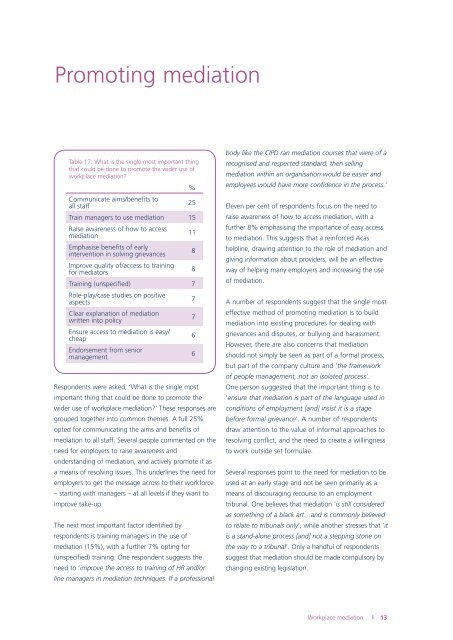Workplace mediation How employers do it - CIPD
Workplace mediation How employers do it - CIPD
Workplace mediation How employers do it - CIPD
Create successful ePaper yourself
Turn your PDF publications into a flip-book with our unique Google optimized e-Paper software.
Promoting <strong>mediation</strong>Table 17: What is the single most important thingthat could be <strong>do</strong>ne to promote the wider use ofworkplace <strong>mediation</strong>?%Communicate aims/benef<strong>it</strong>s toall staff25Train managers to use <strong>mediation</strong> 15Raise awareness of how to access<strong>mediation</strong>11Emphasise benef<strong>it</strong>s of early intervention in solving grievances8Improve qual<strong>it</strong>y of/access to trainingfor mediators8Training (unspecified) 7Role-play/case studies on pos<strong>it</strong>iveaspects7Clear explanation of <strong>mediation</strong>wr<strong>it</strong>ten into policy7Ensure access to <strong>mediation</strong> is easy/cheap6En<strong>do</strong>rsement from seniormanagement6Respondents were asked, ‘What is the single mostimportant thing that could be <strong>do</strong>ne to promote thewider use of workplace <strong>mediation</strong>?’ These responses aregrouped together into common themes. A full 25%opted for communicating the aims and benef<strong>it</strong>s of<strong>mediation</strong> to all staff. Several people commented on theneed for <strong>employers</strong> to raise awareness andunderstanding of <strong>mediation</strong>, and actively promote <strong>it</strong> asa means of resolving issues. This underlines the need for<strong>employers</strong> to get the message across to their workforce– starting w<strong>it</strong>h managers – at all levels if they want toimprove take-up.The next most important factor identified byrespondents is training managers in the use of<strong>mediation</strong> (15%), w<strong>it</strong>h a further 7% opting for(unspecified) training. One respondent suggests theneed to ‘improve the access to training of HR and/orline managers in <strong>mediation</strong> techniques. If a professionalbody like the <strong>CIPD</strong> ran <strong>mediation</strong> courses that were of arecognised and respected standard, then selling<strong>mediation</strong> w<strong>it</strong>hin an organisation would be easier andemployees would have more confidence in the process.’Eleven per cent of respondents focus on the need toraise awareness of how to access <strong>mediation</strong>, w<strong>it</strong>h afurther 8% emphasising the importance of easy accessto <strong>mediation</strong>. This suggests that a reinforced Acashelpline, drawing attention to the role of <strong>mediation</strong> andgiving information about providers, will be an effectiveway of helping many <strong>employers</strong> and increasing the useof <strong>mediation</strong>.A number of respondents suggest that the single mosteffective method of promoting <strong>mediation</strong> is to build<strong>mediation</strong> into existing procedures for dealing w<strong>it</strong>hgrievances and disputes, or bullying and harassment.<strong>How</strong>ever, there are also concerns that <strong>mediation</strong>should not simply be seen as part of a formal process,but part of the company culture and ‘the frameworkof people management, not an isolated process’.One person suggested that the important thing is to‘ensure that <strong>mediation</strong> is part of the language used incond<strong>it</strong>ions of employment [and] insist <strong>it</strong> is a stagebefore formal grievance’. A number of respondentsdraw attention to the value of informal approaches toresolving conflict, and the need to create a willingnessto work outside set formulae.Several responses point to the need for <strong>mediation</strong> to beused at an early stage and not be seen primarily as ameans of discouraging recourse to an employmenttribunal. One believes that <strong>mediation</strong> ‘is still consideredas something of a black art…and is commonly believedto relate to tribunals only’, while another stresses that ‘<strong>it</strong>is a stand-alone process [and] not a stepping stone onthe way to a tribunal’. Only a handful of respondentssuggest that <strong>mediation</strong> should be made compulsory bychanging existing legislation.<strong>Workplace</strong> <strong>mediation</strong> 13

















